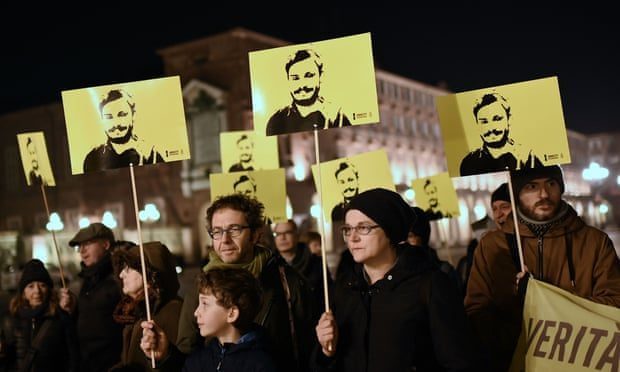
Italy and Egypt are set to cut a major military deal, apparently disregarding tensions caused by the murder of Italian researcher Giulio Regeni in Cairo back in 2016, according to AL Monitor.
Despite the differences between Egypt and Italy over the case of Giulio Regeni, an Italian student whose body was found in Cairo on Feb. 3, 2016, Italian newspapers recently reported that Rome agreed to a major military deal with Cairo, said Mohammad Hanafi in a report on Al Monitor.
According to experts and observers, military and economic cooperation between the two countries is steady and strong and unaffected by any differences.
According to Italy’s daily business newspaper Milano Finanza on Dec. 8, Rome agreed to a billion-dollar military deal with Cairo, with new financial guarantees from the Italian government to Egypt, which might include six frigates, 24 M-346 trainer jets, 24 Eurofighter Typhoon jets, 20 navy patrol boats and one military satellite.
During his visit to the industrial city in el-Roubiki in the Cairo governorate on Dec. 8, Martino Milli, director of the Italian Agency for Development Cooperation, said that Rome supports production projects in Cairo and work is currently underway on a grant project of 3 million euros to develop several projects in Egypt.
These deals indicate that the differences between the two countries over the death of Regeni did not slow down the military and economic cooperation between the two.
This comes at a time when Italy stepped up its position on Dec. 10 in the murder case of Regeni. Rome charged four senior Egyptian security officials with killing the Italian researcher.
The Egyptian security apparatus claimed it was innocent of the accusations, while long deliberations took place between the two countries, which ended up with the Italian authorities sending said four security men to trial in absentia.
In a joint statement between the Egyptian Public Prosecutor and the Italian investigation authorities on Nov. 28, Cairo announced that it closed the investigations into the case of Regeni without identifying the defendants and only indicating that a gang robbing foreigners was behind the killing of Regeni, without specifying names.
In the same statement, the investigative authorities in Rome rejected the Egyptian claims and accused five officials (charges against the fifth one were later dropped) in the Egyptian security of the murder of Regeni. Italian authorities further called on Cairo to describe these officials’ acts as individual behavior and not upon instructions from the Egyptian security apparatus. Egypt did not agree to do so.
Tarek Fahmy, professor of political science at Cairo University, said there is an unjustified escalation on the part of Italian authorities with regard to Regeni’s case, despite the great cooperation from Egypt in the investigations. He added that Egyptian President Abdel Fattah al-Sisi has repeatedly reiterated that Cairo has nothing to hide in the case.
“This issue continues to occasionally spark controversy at the local level, but it is not affecting relations at the political level between the two countries,” Fahmy told Al-Monitor.
He added that “military and economic relations between Egypt and Italy are not affected by any other differences, and this [recent] deal won’t be the last. The cooperation between the two is historical and ongoing. Cairo does not rely on Italy alone to arm its military, as there is cooperation with other countries, such as France, Germany, the UK, the United States and Russia.”
He stressed that military and economic relations between Egypt and Italy are at bay from any political difference, in reference to the Regeni case, which he views as a minor issue in the political and security relations between the two countries.
“Egypt dealt very intelligently with the issue and will not be affected by the ensuing tension — something that was welcomed by the Italian government, which eventually agreed to the deal according to Italian media,” Fahmy added.
Maj. Gen. Gamal Mazloum, adviser to the Nasser High Military Academy, does not believe the Regeni case will affect the historical relations between Cairo and Rome, especially in the military and economic aspects. He stressed that common interests between the two countries are stronger than any dispute, especially in the Eastern Mediterranean Gas Forum, which has recently turned into a regional gas organization based in Cairo. Italy is one of its main members.
“There are also joint military exercises between the two countries and high-level cooperation, which indicate the strong and durable ties between them,” Mazloum Al-Monitor.
He said the huge military deal is not limited to weapons export, but it also entails more job opportunities and support of the Italian economy at a time when the world is suffering from the negative impact of the coronavirus pandemic as well as the revitalization of relations between the two sides.
“Egypt is also a pivotal country in the region, and Rome is well aware of that and is keen on continuing economic and military cooperation. The Regeni case is a fleeting problem that will be overcome in the future and will not affect relations between the two countries,” Mazloum added.
He stressed that Egypt enjoys strong military relations not only with Italy but also with France, Germany, the UK, the United States, Russia and China. Since the 1973 Arab-Israeli War, the Egyptian military has been seeking to diversify weapons sources instead of relying on one source — a trend that has been more accentuated under Sisi — in a bid to increase military capabilities to face the regional challenges and preserve national security, he said. “The countries of the world are also keen to strengthen their relations with Cairo.”
Brig. Gen. Khaled Okasha, member of the National Council for Combating Terrorism, seems to concur with Mazloum, as he said that Egypt enjoys military relations with major countries in the world and has a well-studied and clear scientific plan to modernize and develop its various weapons in the army, such as the navy and air defense, to maintain its national security.
“Egypt’s keenness on diversifying its sources of armament contributes in strengthening its army by bringing in arms from different branches of armed forces from various countries,” Okasha told Al-Monitor via phone.
“Egypt has strong military ties with many countries in the world including France, the United States, England, Russia and not just with Italy. Therefore, the dispute over the Regeni case is something secondary and did not affect in any way the strong economic military relations between Rome and Cairo,” he added.
Okasha explained that Egypt’s great position and its pivotal role in the region put it at risk of great challenges, and therefore it is essential for Cairo to increase its military capabilities to preserve its national security. “In this context, several major countries, including Italy, deal with Cairo, as they are well aware of its great role and share common interests. Egypt maintains stronger ties with France, Germany, the United States and Russia, and does not count on one country only for armament,” he concluded.



